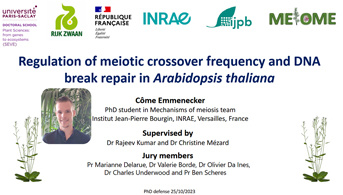Thesis defense: Côme Emmenecker
Regulation of meiotic crossovers frequency and DNA breaks repair in Arabidopsis thaliana
During meiosis, homologous recombination (HR) is essential to repair programmed DNA double-strand breaks (DSBs) to maintain genome stability and it also contributes to enhancing genetic diversity. Indeed, a subset of those DSBs is repaired as crossovers (COs), which are reciprocal DNA exchanges between the parental genomes. Meiotic CO frequency is low, with most species showing less than 3 COs per chromosome per meiosis, which represents a bottleneck for the efficiency of plant breeding programs. Therefore, controlling meiotic CO frequency is of great interest to improve plant breeding strategies. The main objective of my PhD was the development of a chemical screening system on Arabidopsis seedlings for inducing hyper-recombination in plants. With this method, we screened over 20,000 molecules and identified 399 candidate molecules. These molecules open new possibilities for breeding strategies but require further research to test their effect on meiotic recombination. The second objective of my PhD was the characterisation of FIGL1 functions during meiotic DNA repair in Arabidopsis. During HR, RAD51 and DMC1 recombinases initiate accurate DNA repair through strand invasion, regulated by various factors. FIGL1 acts as a negative regulator of RAD51 and DMC1 accumulation during meiosis, suggesting its involvement in strand invasion regulation. However, the underlying mechanism of FIGL1 activity and its relationship with various regulators of strand invasion are not fully understood. During my PhD, I investigated the genetic interaction between figl1 and a series of mutants involved either in the regulation of RAD51 and DMC1 or in the structure of the meiotic chromosome axis using genetic and cytological analysis. My results reveal a role of FIGL1 in meiotic DSB repair when combined with some specific mutants. Overall, this study contributes to shedding light on the fundamental mechanism of strand invasion regulation in Arabidopsis during meiotic DNA repair.
Members of the jury:
> Valérie Borde (Referee) - CNRS, DIG-CANCER, Paris
> Olivier Da Ines (Referee) - CNRS, GreD, Clermont-Ferrand
> Marianne Delarue (Examinator) - IPS2, Université Paris-Saclay, Gif-sur-Yvette
> Charles Underwood (Examinator) - MPIPZ, Koln, Gernany
> Ben Scheres (Examinator) - Wageningen University PDB-Wageningen, Netherlands
Co-supevisor: -Rajeev Kumar - INRAE, IJPB, Versailles
Co-supervisor: - INRAE, IJPB, Versailles
Back
